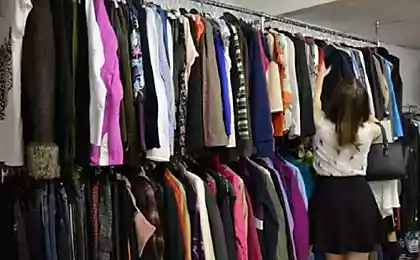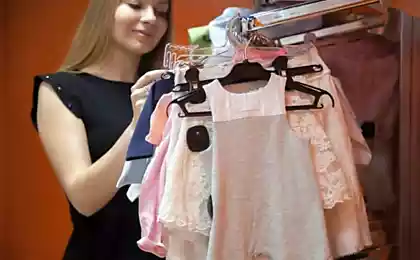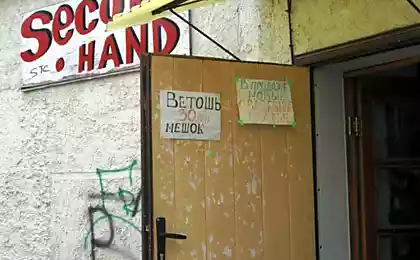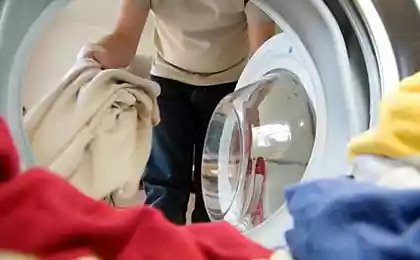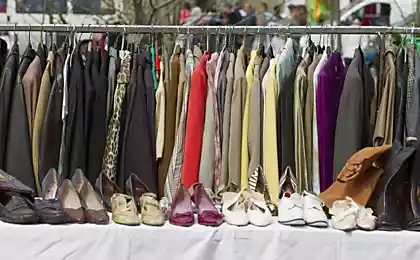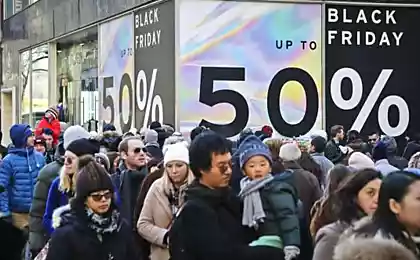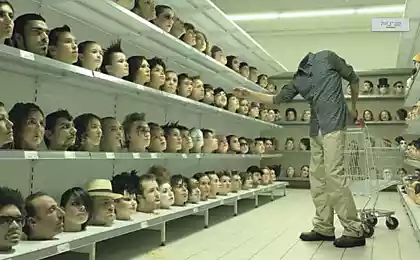1238
How things work: Employee second-hand
Things to us driven mainly from Europe - England, Germany, and Italy. There are engaged in the collection of special companies that have this state license. They set on the streets of the containers in which people dump their waste clothing and shoes. Part of the package to collect things hang right on the door handles of houses and apartments. On the appointed date specified on the package, people fill it with things and put the door. For a week "collectors" get tons of goods that are sent to other European countries. Or here, in Ukraine.
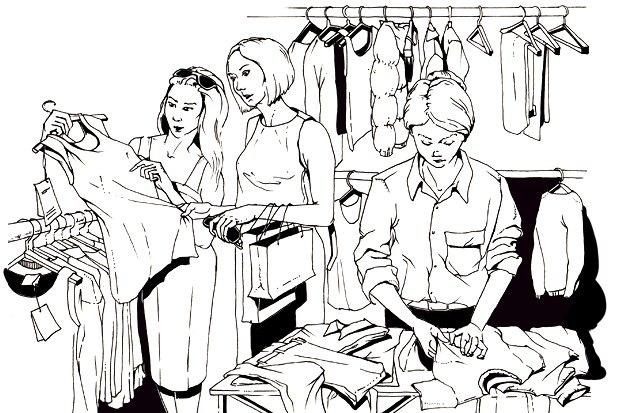
Our market belongs to the Arabs. They have their own people in Europe who agree to supply. The customs office to provide verification of documents, pay various fees and VAT - goods for second-hand subject to the same taxes as any other. In addition, the driver must be wagon certificate disinfection. This means that things have been chemically treated and can be imported into the country. After that, the goods are sent to the warehouse.
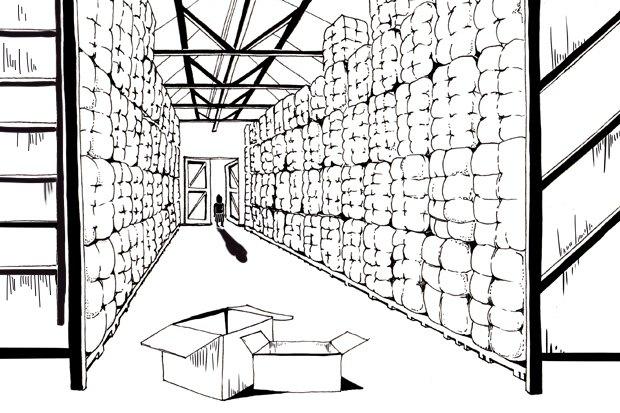
Sort
In Europe, things are sorted without revealing Bale: the quality of goods is determined according to where he was taken. In England there is poor Indian areas where families of five or seven children - there are clothes and shoes zanashivayut to holes. Goods arriving from such places are sold abroad at low prices. But there is a rich areas where people wear clothes no more than one season, give branded items are often discarded entirely new: the size did not fit or has ceased to please. Goods arrived there, is more expensive.
Sort items in stock. Where he is known to few. Arabs are working there, trying not to let other people, but sometimes the name of our girls. I worked in a warehouse a couple of times. A terrible sight: the entire space from floor to ceiling scored bales, around things, the things - Expand nowhere. When it comes to party goods store was closed and no one out until until everything is sorted. You can not go out to buy any water or go to the toilet. God forbid a thing to take away - all under strict control.
To cover the costs, the margin can make three hundred and five hundred percent.
Sort engaged mainly in people who are well versed in the brand: you need to understand how to store much this or that thing. First, the clothes sorted by type: jeans, shirts, jackets and so on. Then divided into three categories: the first - the new stuff, the goods in good condition or well-known brands, the second - more worn things, sometimes with small spots and subtle marriage, the third - junk. The third category of goods does not go to the market. It is sold to industrial companies and factories for the manufacture of technical wool.
Prices
In Europe, the goods are purchased for pennies - from one to three euros per kilo. But in view of all duties, taxes, transportation costs, expenses for the maintenance of outlets, warehouse and the cost of staff salaries increased by several times. In addition, it often happens that things are the third category accounts for 30-40% of the total. This means that almost half of the goods sold to industrial companies is 10-20 times cheaper cost. To cover the costs, the margin of things first and second category can make, and three hundred and five hundred percent.
Each thing separately nobody appreciates: clothes so much that it would be gone a week. A little different coming only from branded items. They were initially put off by itself, and then, in addition to the standard mark-up, throws more about a hundred percent for the brand. Hunters are many brands and sorters are aware of this.
Updated product range and unsold
I have repeatedly faced with the rumors that a new delivery workers second-hand first name is "their", who choose the best of everything, and then lay out the goods on the shelves. So, it is a myth, and in any second-hand, if it is not your own shop, it is not. We even yourself can not buy a thing before it appears on the point - such rules. And when the goods are brought from a warehouse and begin to unload, then choose their already busy. Do not have time to spread, as there are regular customers and wholesale buyers. Stand and wait, when you can buy something.
My friend from Germany can not believe that they are there things for free is given, and we are here for them to take 5 euros.
Bring a lot of clothes, but to a new delivery, which we have twice a week, try to sell everything. If not sold, to reduce the price, as long as not snap up. First, 30%, and then by 40-50%, and then we return at all for a penny. And yet something remains - lay it along with newcomers. If you can not sell for a long time, the goods are taken back to the warehouse, and then together with the things of the third category selling industrial companies as rags.
Customers
Customers have three types. There are very poor, for whom second-hand - the only way to update your wardrobe. They often go to families, looking in bags and bales, looking for all the most cheap. There are so many, we are even not pay attention. There are people of moderate means. They do not stand out - and can dig in a pile, and on hangers look. And there is a very different sort of customers - young women in mink coats and a manicure, fashionable young people, celebrities. They buy things only with hangers, and that is on the shelves, do not even look. Here recently we girls from the cooking show came, chose jeans, hoodies, t-shirts - many just bought. A spring came participants show about psychics. Personally, I have nothing they have, but the girls from the neighboring row found something. Actors often come to theaters. Say, sew costumes for performances expensive here and come here.
Changes
I'm on the second-hand market for ten years. First worked on Shulyavka, and when there broke up, moved to the "forest". Frankly, at Shulyavka I liked. There and the prices were lower and the quality is better. Over the past few years are all very expensive. This is due to the increase in gasoline prices, the increase in rents and customs duties and currency fluctuations. Previously, the price of second-hand were penny, and now T-shirts sell for 50 hryvnia. My friend from Germany can not believe that they are there things for free is given, and we are here for them to take 5 euros.
But on the other hand, if you buy, why not sell it? Before second-hand hesitated, then dressed in secret from friends and acquaintances, concealed the origin of things. And now it is fashionable. Come to us in search of interesting things, clothing brands. The youth said, we've got such brands have, which in Kiev stores for a long time will not.

Our market belongs to the Arabs. They have their own people in Europe who agree to supply. The customs office to provide verification of documents, pay various fees and VAT - goods for second-hand subject to the same taxes as any other. In addition, the driver must be wagon certificate disinfection. This means that things have been chemically treated and can be imported into the country. After that, the goods are sent to the warehouse.

Sort
In Europe, things are sorted without revealing Bale: the quality of goods is determined according to where he was taken. In England there is poor Indian areas where families of five or seven children - there are clothes and shoes zanashivayut to holes. Goods arriving from such places are sold abroad at low prices. But there is a rich areas where people wear clothes no more than one season, give branded items are often discarded entirely new: the size did not fit or has ceased to please. Goods arrived there, is more expensive.
Sort items in stock. Where he is known to few. Arabs are working there, trying not to let other people, but sometimes the name of our girls. I worked in a warehouse a couple of times. A terrible sight: the entire space from floor to ceiling scored bales, around things, the things - Expand nowhere. When it comes to party goods store was closed and no one out until until everything is sorted. You can not go out to buy any water or go to the toilet. God forbid a thing to take away - all under strict control.
To cover the costs, the margin can make three hundred and five hundred percent.
Sort engaged mainly in people who are well versed in the brand: you need to understand how to store much this or that thing. First, the clothes sorted by type: jeans, shirts, jackets and so on. Then divided into three categories: the first - the new stuff, the goods in good condition or well-known brands, the second - more worn things, sometimes with small spots and subtle marriage, the third - junk. The third category of goods does not go to the market. It is sold to industrial companies and factories for the manufacture of technical wool.
Prices
In Europe, the goods are purchased for pennies - from one to three euros per kilo. But in view of all duties, taxes, transportation costs, expenses for the maintenance of outlets, warehouse and the cost of staff salaries increased by several times. In addition, it often happens that things are the third category accounts for 30-40% of the total. This means that almost half of the goods sold to industrial companies is 10-20 times cheaper cost. To cover the costs, the margin of things first and second category can make, and three hundred and five hundred percent.
Each thing separately nobody appreciates: clothes so much that it would be gone a week. A little different coming only from branded items. They were initially put off by itself, and then, in addition to the standard mark-up, throws more about a hundred percent for the brand. Hunters are many brands and sorters are aware of this.
Updated product range and unsold
I have repeatedly faced with the rumors that a new delivery workers second-hand first name is "their", who choose the best of everything, and then lay out the goods on the shelves. So, it is a myth, and in any second-hand, if it is not your own shop, it is not. We even yourself can not buy a thing before it appears on the point - such rules. And when the goods are brought from a warehouse and begin to unload, then choose their already busy. Do not have time to spread, as there are regular customers and wholesale buyers. Stand and wait, when you can buy something.
My friend from Germany can not believe that they are there things for free is given, and we are here for them to take 5 euros.
Bring a lot of clothes, but to a new delivery, which we have twice a week, try to sell everything. If not sold, to reduce the price, as long as not snap up. First, 30%, and then by 40-50%, and then we return at all for a penny. And yet something remains - lay it along with newcomers. If you can not sell for a long time, the goods are taken back to the warehouse, and then together with the things of the third category selling industrial companies as rags.
Customers
Customers have three types. There are very poor, for whom second-hand - the only way to update your wardrobe. They often go to families, looking in bags and bales, looking for all the most cheap. There are so many, we are even not pay attention. There are people of moderate means. They do not stand out - and can dig in a pile, and on hangers look. And there is a very different sort of customers - young women in mink coats and a manicure, fashionable young people, celebrities. They buy things only with hangers, and that is on the shelves, do not even look. Here recently we girls from the cooking show came, chose jeans, hoodies, t-shirts - many just bought. A spring came participants show about psychics. Personally, I have nothing they have, but the girls from the neighboring row found something. Actors often come to theaters. Say, sew costumes for performances expensive here and come here.
Changes
I'm on the second-hand market for ten years. First worked on Shulyavka, and when there broke up, moved to the "forest". Frankly, at Shulyavka I liked. There and the prices were lower and the quality is better. Over the past few years are all very expensive. This is due to the increase in gasoline prices, the increase in rents and customs duties and currency fluctuations. Previously, the price of second-hand were penny, and now T-shirts sell for 50 hryvnia. My friend from Germany can not believe that they are there things for free is given, and we are here for them to take 5 euros.
But on the other hand, if you buy, why not sell it? Before second-hand hesitated, then dressed in secret from friends and acquaintances, concealed the origin of things. And now it is fashionable. Come to us in search of interesting things, clothing brands. The youth said, we've got such brands have, which in Kiev stores for a long time will not.

